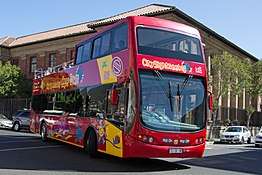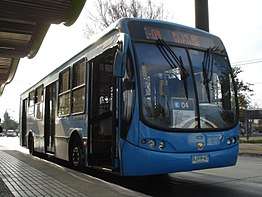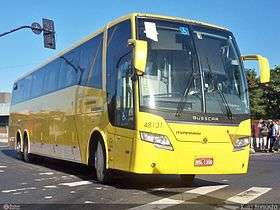Busscar
Busscar Ônibus S.A. was a Brazilian bus manufacturer that built coaches, trolleybuses, charter and tour buses, founded on 17 September 1946. The company was based in Joinville in the south of Brazil, where it had industrial premises that cover 1,000,000 m2 (11,000,000 sq ft), including a building of 84,000 m2 (900,000 sq ft) The Busscar Ônibus S.A. was in defunct on 27 September 2012. The fleet of buses which were shipped to Barbados were the 45 Mercedes-Benz (OH1821) Busscar Urbanuss buses, along with the air-conditioned buses in November 1999, but they would have added a fleet of the new 95 Mercedes-Benz (OH1821) Busscar Urbanuss 1 buses, along with the air-conditioned buses in November 2004 and the 100 Mercedes-Benz (OH1821) Busscar Urbanuss 2 buses and also the 100 Mercedes-Benz (OH1821) Busscar Urbanuss Pluss buses, along with the air-conditioned buses in November 2005.
| automotive | |
| Industry | Automotive |
| Fate | Bankruptcy |
| Successor | Carbuss - Indústria de Carrocerias Catarinense Ltda. |
| Founded | September 17, 1946 |
| Defunct | September 27, 2012 |
| Headquarters | , |
| Products | Buses, coaches, trolleybuses |
| Website | http://www.busscar.com.br |
History



The business had its origins in a firm created on September 17, 1946, when two brothers of Swedish descent, Augusto Bruno Nielson and Eugênio Nielson, opened a carpentry shop in Joinville, where they made wooden furniture, window frames and desks. One year later, Nielson & Brother remodeled the first bus body. In 1949 they built a bus body entirely in wood, attached to a large Chevrolet chassis.
This was the starting point of a business that in a few decades would turn into an important bus manufacturing company in the worldwide market.
When Harold Nielson (Augusto's elder son) joined the company in 1956 it was en route to becoming the segment leader in Brazil, with innovative and revolutionary products, such as the Diplomata model in 1961, the Urbanuss in 1987, the Panorâmico DD in 1998, and many others.
In 1990, the business, by then called Carrocerias Nielson, launched a new family of vehicles and changed its name to Busscar Ônibus, creating a mark that is still known today in international and Brazilian markets, despite the company's later demise.
On 27 September 2012, the Brazilian Judiciary of Santa Catarina declared the bankruptcy of Busscar due to the effects from economic crisis of 2008.[1]
The judge of the 5th Civil Court of Joinville, Walter Santin Júnior, approved in a final ruling on 21 March 2017, the purchase of Joinville factory. For the business is to be deposited R$9.4 million in cash and another R$57.74 million to be paid in 52 installments with monetary correction. None of the new projects and new company name are known, however since May 2017, new contracts employment could be signed after End of the Justice process.[2]
On June 12, 2017 Maurício Lourenço da Cunha represented by Sergio Souza assumes the factories and gave a name Carbuss - Indústria de Carrocerias Catarinense Ltda.[3]
Cultural references
A Bus produced by Busscar appeared on the tenth episode of the fourth season of Showtime's series Homeland (13 hours in Islamabad).
Former models
Transit buses:
- Busscar Urbanuss
- Busscar Urbanuss Ecoss II
- Busscar Urbanuss Pluss
- Pluss Híbrido
- Pluss Low Floor
- Pluss Troley
- Pluss Tour
- Articulado Low Floor
- Nielson Urbanus
- Busscar Urbanus I
- Busscar Urbanus II
- Busscar Urbanus II SS
Coaches:
- Panorâmico DD
- Jum Buss 400
- Jum Buss 380
- Jum Buss 360
- Vissta Buss Elegance 360
- Vissta Buss Elegance 380
- Vissta Buss HI
- Vissta Buss LO
- El Buss 340
- El Buss 320
- Interbuss
- Nielson Diplomata 2.40
- Nielson Diplomata 2.50
- Nielson Diplomata 2.60
- Nielson Diplomata 310
- Nielson Diplomata 330
- Nielson Diplomata 350
- Nielson Diplomata 380
- El Buss 320 I
- El Buss 340 I
- El Buss 360 I
- Jum Buss 340 I
- Jum Buss 360 I
- Jum Buss 380 I
- Jum Buss 340T I
- Jum Buss 360T I
- Jum Buss 380T I
- El Buss 320 II
- El Buss 340 II
- Jum Buss 360 II
- Jum Buss 380 II
- Jum Buss 400 Panorâmico
- Interbus
- Vissta Buss
References
- "Juiz decreta a falência da Busscar Ônibus em Joinville (in Portuguese)".
- "Contratações para a nova fábrica da Busscar podem começar em maio, diz advogado da Caio (in Portuguese)".
- http://anoticia.clicrbs.com.br/sc/economia/noticia/2017/06/loetz-confira-fotos-de-como-esta-hoje-a-fabrica-da-busscar-joinville-por-dentro-9814241.html
External links
| Wikimedia Commons has media related to Busscar vehicles. |